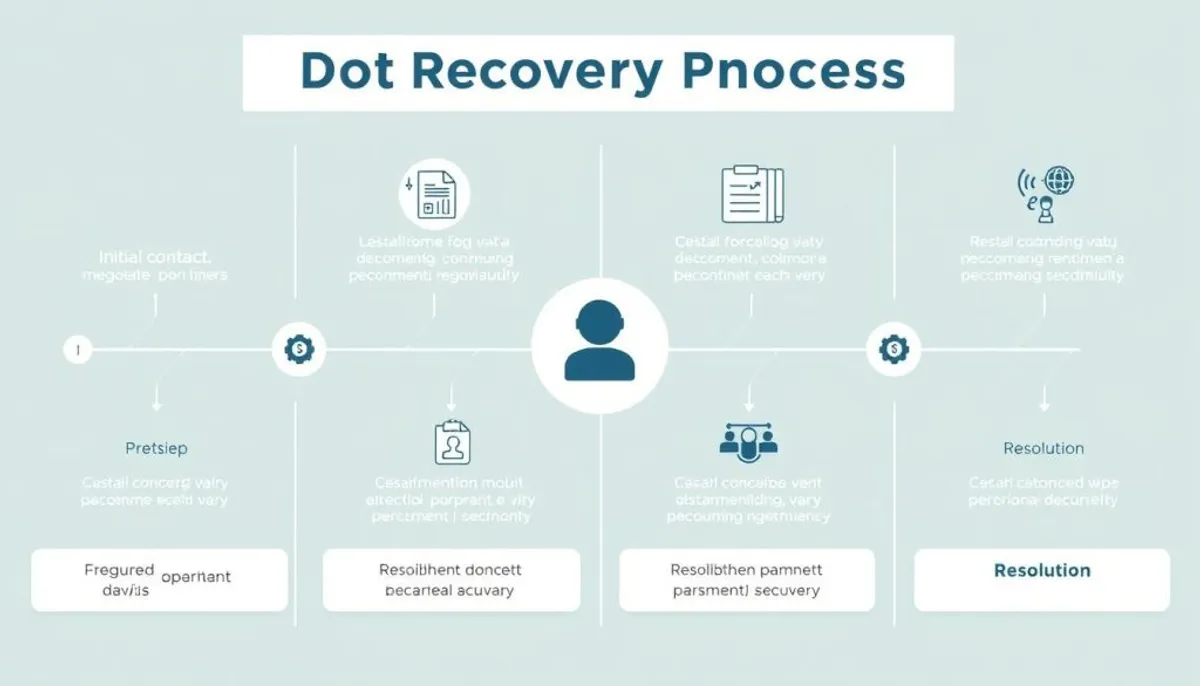Collection agencies are pivotal in the realm of debt recovery. They dedicate themselves to collecting delinquent accounts, acting on behalf of creditors or as debt owners. Their scope encompasses a broad spectrum of past-due accounts, from credit card balances to medical bills. Their objective is to reclaim outstanding balances, thus preserving financial stability.
Grasping the nuances of collection agencies is essential for individuals facing unpaid debts or seeking to enhance their credit repair endeavors. These entities employ diverse strategies to engage debtors, striving to recover funds while adhering to stringent legal frameworks.

It’s noteworthy that debt collectors can initiate contact only after a payment is at least 30 days overdue. They must also dispatch a debt validation letter within five days of their initial outreach. These regulations are in place to safeguard both debtors and creditors, ensuring a fair and equitable process.
Key Takeaways
- Collection agencies recover delinquent accounts for creditors
- They handle various types of debts, from credit cards to utility bills
- Agencies must follow strict legal guidelines in their collection efforts
- Debt collectors can’t contact debtors until 30 days past due
- A debt validation letter must be sent within 5 days of initial contact
- Understanding your rights can help in navigating debt collection situations
Understanding Debt Collection Agencies and Their Role
Debt collection agencies are pivotal in the financial system. They assist creditors in retrieving unpaid debts, ensuring the economy’s credit flow remains uninterrupted. Exploring debt collection practices and consumer rights is essential.
Definition and Purpose of Collection Agencies
Collection agencies are entities dedicated to recovering unpaid debts. They act as intermediaries for creditors or acquire delinquent debts to collect independently. Their intervention occurs when a debtor is 60-90 days overdue. Their objective is to collect outstanding debts while respecting legal frameworks.
Types of Debts Collection Agencies Handle
Collection agencies manage a variety of debts, encompassing:
- Credit card balances
- Medical bills
- Personal loans
- Utility bills
- Student loans
How Collection Agencies Make Money
Collection agencies generate income through two primary channels:
- Commission-based: They earn a percentage (usually 25% to 50%) of the recovered amount when working for creditors.
- Debt purchasing: They acquire delinquent debts at a reduced price, profiting from the difference between the purchase and recovery amounts.
It’s crucial to acknowledge that debt collectors must adhere to specific regulations. They can only contact individuals between 8 a.m. and 9 p.m. and are restricted to seven calls within a seven-day span. Familiarity with these rules is vital for safeguarding consumer rights during the debt collection process.
What Do Collection Agencies Do – The Core Functions
Collection agencies are pivotal in the debt recovery process, aiming to collect funds from delinquent accounts. They employ diverse strategies to engage borrowers, encouraging them to settle their outstanding debts.
One of their key functions is to establish communication with debtors through phone calls and letters. The goal is to negotiate payment plans. If initial attempts fail, agencies may conduct asset searches to gauge a debtor’s repayment capacity.
Collection agencies frequently purchase delinquent accounts from creditors at significantly reduced rates, often just pennies on the dollar. This approach enables them to pursue full repayment while generating profits. For example, an agency might acquire a $1,000 debt for $100, aiming to recover the full amount.
- Locate and contact debtors
- Negotiate payment plans
- Conduct asset searches
- Purchase and manage delinquent accounts
If conventional collection methods are ineffective, agencies may resort to legal action. This can involve seeking court judgments, initiating wage garnishments, or placing liens on property. It’s crucial to recognize that debt collection statutes of limitations vary by state, spanning from 3 to 10 years.
In summary, collection agencies act as intermediaries between creditors and debtors. They strive to recover funds while adhering to legal frameworks and consumer protection laws.
The Legal Framework of Debt Collection
The landscape of fair debt collection is defined by pivotal laws that safeguard consumers. These regulations delineate the operational parameters for debt collectors and enumerate the rights of borrowers.
Fair Debt Collection Practices Act (FDCPA)
The FDCPA serves as the cornerstone of federal legislation governing debt collection. It prohibits the use of abusive, unfair, or deceptive practices in the collection of personal, family, or household debts. Debt collectors are barred from initiating contact before 8 a.m. or after 9 p.m. They are also prohibited from employing harassment through calls, texts, or emails.
State-Specific Collection Laws
States possess their own debt collection statutes, which often align with the FDCPA but may extend additional protections. Some state laws extend coverage to the original creditor, a provision not included in the FDCPA. It is advisable to consult with your state’s attorney general’s office to gain insight into local regulations.
Consumer Rights and Protections
Consumers possess the right to dispute inaccuracies on their credit scores. Debt collectors must cease communication if a lawyer represents the consumer. In the event of unfair practices, consumers can lodge a complaint with the Consumer Financial Protection Bureau.
Grasping these legal frameworks is essential for safeguarding one’s rights during debt collection. It is imperative to comprehend how these regulations impact credit scores and overall financial health.
The Debt Collection Process Explained

The debt collection process commences when a payment is 30 days overdue. At this juncture, creditors often turn to collection agencies for assistance. These agencies acquire debts at a rate of 30-35% of the original amount, aiming to collect the full sum.
Collection agencies employ a variety of methods to recover funds. They may reach out to debtors via phone calls, letters, or digital platforms. The Fair Debt Collection Practices Act (FDCPA) governs these interactions, ensuring no contact before 8 a.m. or after 9 p.m. without consent.
Within five days of first contact, collectors must furnish validation details. This includes information about the creditor, the amount owed, and how to dispute the debt. Debtors have 30 days to challenge the debt in writing.
If the debt remains unpaid, collectors may report it to credit bureaus. This action can result in the debt’s presence on credit reports for seven years plus 180 days from the delinquency date. In extreme cases, collectors might pursue legal action, leading to wage garnishment or asset seizure.
The statute of limitations on debts varies by state, spanning from 3 to 15 years. Once this period elapses, the debt becomes time-barred, and collectors cannot sue for payment. Yet, they may still attempt to collect, subject to state laws.
Communication Methods Used by Collection Agencies
Collection agencies employ various strategies to reach consumers during debt recovery. These methods balance effectiveness with consumer rights protection. Let’s explore the primary communication channels and their legal requirements.
Phone Calls and Letters
Hard copy letters remain the most authoritative form of communication in debt collection. They’re often sent via registered mail to ensure receipt. Phone calls follow, allowing for open discussions about the debt situation. Agencies must respect time restrictions, avoiding calls before 8:00 a.m. or after 9:00 p.m. in the consumer’s time zone.
Digital Communication Channels
To enhance effectiveness, collection agencies now use digital methods alongside traditional ones. These include emails and text messages. They must still adhere to strict guidelines to protect consumer rights.
Legal Requirements for Contact
Regulation F defines who can be contacted about a debt, including spouses, parents of minors, and executors of estates. Agencies must cease communication during consumer-designated inconvenient times or places. If a debt is disputed, consumers may need to provide written evidence.
| Communication Method | Effectiveness | Legal Considerations |
|---|---|---|
| Letters | High | Must include debt details |
| Phone Calls | Medium | Time restrictions apply |
| Emails | Medium | Consent required |
| Text Messages | Low | Strict opt-in rules |
Professionalism and integrity are crucial in debt collection. Agencies must balance effective communication with strict adherence to laws protecting consumer rights. This approach ensures fair practices while working towards debt resolution.
Impact of Collections on Your Credit Score
Collection accounts can significantly affect your credit score. Credit bureaus typically keep these accounts on your report for up to seven years from the date of first delinquency. The impact varies based on your initial score range, with higher scores taking a bigger hit.
Recent changes in credit reporting practices have brought some relief. Paid medical collections and those under $500 no longer appear on credit reports. This shift benefits consumers dealing with unexpected healthcare costs.
Credit repair strategies can help mitigate the damage. Newer scoring models, like FICO Score 9 and 10, disregard paid collections. They also treat unpaid medical collections over $500 less harshly than older versions.
| Collection Type | Reporting Status |
|---|---|
| Paid Medical | Not Reported |
| Medical Under $500 | Not Reported |
| Unpaid Medical Over $500 | Reported, Less Impact |
| Non-Medical | Reported |
It’s crucial to note that paying off a collection doesn’t guarantee a score increase. The impact can vary, sometimes even causing a temporary dip. Regular monitoring of your credit reports can help you stay informed about collections and their effects on your credit health.
ti3: A Modern Alternative to Traditional Collection Agencies
Debt recovery has undergone significant transformation with the advent of technology. ti3 introduces a novel methodology for managing overdue accounts. This software-as-a-service platform simplifies the collection process, empowering businesses to reclaim funds efficiently without compromising client relationships.
Automated Payment Reminders
ti3 leverages advanced automation to dispatch timely reminders. This innovation minimizes the necessity for manual interventions, thus conserving time and resources for businesses. Research indicates that 30% of unpaid invoices necessitate at least three reminders for resolution, underscoring the importance of automated systems in debt recovery.
Streamlined Collection Process
The platform’s design enhances the efficiency of debt collection. It tracks overdue accounts, escalates issues when necessary, and facilitates smooth payment processing. This streamlined approach can significantly reduce the average payment duration from over 30 days with manual processing to just 14 days with automated systems.
Maintaining Client Relationships
Unlike traditional agencies, ti3 prioritizes the preservation of business relationships. Its approach is less confrontational, focusing on resolving issues amicably rather than employing threats. This strategy is essential, as 89% of small businesses report that late payments impede growth, emphasizing the importance of maintaining positive client interactions.
| Feature | Traditional Agencies | ti3 Platform |
|---|---|---|
| Cost | High (20-30% increase) | Low (reduced overhead) |
| Process Speed | Slow (manual) | Fast (automated) |
| Client Relationships | Often damaged | Maintained |
| Legal Complexity | High | Low |
By opting for ti3, businesses can enhance their debt recovery capabilities and potentially diminish the necessity for credit repair services. This contemporary solution addresses the shortcomings of traditional collection methods, offering a more efficient and client-friendly approach to managing overdue accounts.
Legal Actions and Enforcement Methods
Debt collection practices often involve legal actions when other methods fail. Collection agencies may seek court judgments to recover debts, affecting consumer rights. It is essential for both creditors and debtors to understand these processes.
Court Judgments
When debts are unpaid, collectors might file lawsuits. Debtors have 20 to 30 days to respond to a summons. If they fail, a default judgment favoring the creditor can be issued. Seeking legal advice is crucial in such situations.
Wage Garnishment
After obtaining a judgment, creditors can request wage garnishment. This allows them to deduct money directly from a debtor’s paycheck. Laws, though, limit the amount that can be garnished to protect debtors’ basic living expenses.

Asset Seizure Procedures
Creditors may also pursue asset seizure or place liens on property. These actions can include freezing bank accounts or claiming ownership of personal property. It’s important to note that certain assets, like federal benefits, have special protections against seizure.
In 2015, the Consumer Financial Protection Bureau returned $360 million to consumers through enforcement actions against unlawful debt collection practices. This underscores the significance of knowing your rights as a consumer when dealing with debt collectors.
Time Limitations and Statute of Limitations
Grasping the statute of limitations is vital for successful debt recovery and credit repair. This legal timeframe varies across states and debt categories, generally spanning from three to six years. It’s essential to recognize that, despite the statute of limitations, it doesn’t nullify the debt entirely.
The statute of limitations’ commencement varies by state. In some, it begins with the first missed payment, while others start with the last payment made. Notably, making a partial payment or acknowledging an old debt can often reset this timeframe.
Below is a summary of typical statute of limitations for various debt types:
| Debt Type | Typical Range (Years) | Shortest | Longest |
|---|---|---|---|
| Credit Card | 3-10 | 3 (13 states) | 10 (2 states) |
| Written Contracts | 3-15 | 3 (Delaware, North Carolina) | 15 (Ohio) |
| Oral Agreements | 2-6 | 2 | 6 |
| Promissory Notes | 3-15 | 3 | 15 |
It’s important to note that federal student loans are not subject to a statute of limitations. Even after the statute expires, debt collectors may still try to collect. If you’re dealing with debt, exploring a debt management plan could lead to becoming debt-free in under five years.
Dealing with Debt Collectors: Your Rights and Options
Navigating the realm of debt collection can be overwhelming. Yet, understanding your rights is crucial for fair treatment. Consumer rights are essential in safeguarding you against unfair practices.
Validation of Debt Requirements
Upon initial contact, debt collectors must furnish written details about your debt within five days. This includes the exact amount and the creditor’s identity. You have a 30-day window to contest the debt in writing. During this period, collection activities must cease until the debt’s verification.
Dispute Resolution Process
If you question the debt’s accuracy, you can dispute it. Compose a letter to the collector detailing your reasons for doubting the debt’s validity. They are obligated to investigate and present evidence supporting the debt. It’s important to note that making a partial payment can reset the statute of limitations, so caution is advised.
Cease Communication Requests
You possess the right to request that debt collectors cease communication. A written request, known as a “drop dead letter,” suffices. Once received, collectors can only reach out for specific purposes, such as legal proceedings. This doesn’t eliminate the debt but can alleviate your stress.
Debt collectors are restricted to seven weekly calls per debt. They cannot contact you at work if you’ve explicitly requested they refrain from doing so. If collectors infringe upon your rights, you can lodge a complaint with the Consumer Financial Protection Bureau.
Settlement and Negotiation Strategies
Dealing with debt can be overwhelming. With over 64 million Americans facing collections, it’s crucial to understand effective debt recovery strategies. Negotiating with collection agencies can lead to favorable outcomes and aid in credit repair.
Collection agencies often settle for less than the full amount owed. Reports show that some debtors successfully negotiate payments as low as one-third of their total debt. When approaching negotiations, consider these tips:
- Offer a lump-sum payment
- Request removal of negative credit report entries
- Get all agreements in writing
- Avoid sharing bank account information directly
Remember, you have rights under the Fair Debt Collection Practices Act. Collectors must provide essential debt information within five days of contact and can only reach out between 8 AM and 9 PM.
When negotiating, aim for a settlement between 25% to 50% of the total debt. If a lump sum isn’t feasible, discuss payment plan options after agreeing on a final figure. Be aware that settled debts may still impact your credit score for seven years, but can be marked as “paid” following settlement.
| Negotiation Strategy | Potential Outcome |
|---|---|
| Lump-sum payment | Up to 66% reduction in debt |
| Payment plan | Extended time to pay, possible interest reduction |
| Credit report negotiation | Possible removal of negative entries |
By understanding these strategies, you can approach debt recovery with confidence and work towards effective credit repair.
Conclusion
Debt collection practices are fundamental in the financial sector, with over 3,900 collection firms operating in the U.S. These entities manage a broad spectrum of consumer debts, encompassing everything from credit cards to medical expenses. Grasping the debt collection process is vital for safeguarding consumer rights and preserving financial stability.
The industry’s structure is varied, with firms of all sizes contributing to the $12.175 billion in annual revenue. While large agencies with 500+ employees significantly contribute to this income, smaller firms with fewer than 20 employees constitute the majority. This diversity ensures effective management of diverse debt types.
For individuals dealing with debt collection, it is crucial to be aware of their rights. The Fair Debt Collection Practices Act (FDCPA) offers essential protections, including restrictions on collection calls to between 8 a.m. and 9 p.m. and limits on weekly contacts. These regulations strike a balance between debt recovery and consumer protection. Understanding these laws can support credit repair efforts and facilitate proactive engagement with collectors when needed.
RelatedRelated articles



